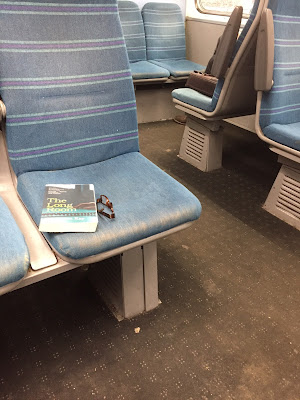I've just spent a most enjoyable long weekend down in Newhaven, and I'm very pleased to say that the train journey, both ways, went without a hitch (and for only £36.50 each way as well).
Every train left on time, and if a couple of them arrived a few minutes later than scheduled, that just meant a bit less time to wait, but not so much as to cause panic. The longest wait I had was half an hour, and most of that was spent on the (stationary) train.
At Brighton I finally remembered that I wanted to be in the middle of the Thameslink train, not at the front. The Thameslink was less crowded in the middle of a weekday than it is at weekends.
No one sat next to me on any train, either way. On the way back there were three separate reservations (St Pancras to Leicester, Leicester to Derby, and Derby to Sheffield) for the window seat and not one of them was used.
It was slightly unnerving that the Seaford train (313208) left Brighton from Platform 7, but the correct order of the universe was restored when 313210 disgorged me onto Platform 8 on the way back.
I took a few 313 interior photos, because who knows how much longer they'll be around?
When I got back to Sheffield, I got the tram from the station. I waited five minutes and it cost me £2, and saved me a long and hilly walk (although there's still a hill at the end).
There is just one, very tiny, irritant. Why is it that despite it being a perfectly valid route (and indeed, one suggested by and pre-booked via the National Rail website) my tickets never work in the Thameslink barriers at St Pancras, in either direction?




Advance tickets are not valid for break of journey or for finishing your journey short of the destination on the ticket. This is to stop people taking advantage of our crazy fares system whereby it can be cheaper to buy a ticket for somewhere farther away from where you are going. But when you need to change trains and pass through a barrier to do so, as with the Thameslink barriers at St. Pancras, the gates don't know whether you are making a legitimate change of train or trying to buck the system. They therefore reject the ticket so that a human can intervene and check. That's my theory anyway!
ReplyDeleteJim may well be right, although the same could apply at the East Midlands gates and they were presumably fine, possibly because having the gates set otherwise would trigger too many rejected tickets to cope with. The Thameslink setting may be a deliberate decision or an oversight. What I can say from bitter experience is that the data stored in the gates to check tickets is generally hand-cranked by someone looking at a rail network map and a list of ticket types and rules in a soundproofed room with a bucket of cold water to stick their head in every now and then. It's infernally complicated and hard to get right!
ReplyDeleteBut if it were for the reason you say Jim, it wouldn't stop me travelling short - once through the first set of barriers, whether automatic or human, I can make a run for the Euston Road anyway ...
ReplyDelete